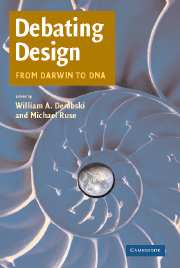Book contents
1 - General Introduction
Published online by Cambridge University Press: 05 June 2012
Summary
Intelligent Design is the hypothesis that in order to explain life it is necessary to suppose the action of an unevolved intelligence. One simply cannot explain organisms, those living and those long gone, by reference to normal natural causes or material mechanisms, be these straightforwardly evolutionary or a consequence of evolution, such as an evolved extraterrestrial intelligence. Although most supporters of Intelligent Design are theists of some sort (many of them Christian), it is not necessarily the case that a commitment to Intelligent Design implies a commitment to a personal God or indeed to any God that would be acceptable to the world's major religions. The claim is simply that there must be something more than ordinary natural causes or material mechanisms, and moreover, that something must be intelligent and capable of bringing about organisms.
Intelligent Design does not speculate about the nature of such a designing intelligence. Some supporters of Intelligent Design think that this intelligence works in tandem with a limited form of evolution, perhaps even Darwinian evolution (for instance, natural selection might work on variations that are not truly random). Other supporters deny evolution any role except perhaps a limited amount of success at lower taxonomic levels – new species of birds on the Galapagos, for instance. But these disagreements are minor compared to the shared belief that we must accept that nature, operating by material mechanisms and governed by unbroken natural laws, is not enough.
- Type
- Chapter
- Information
- Debating DesignFrom Darwin to DNA, pp. 3 - 12Publisher: Cambridge University PressPrint publication year: 2004

